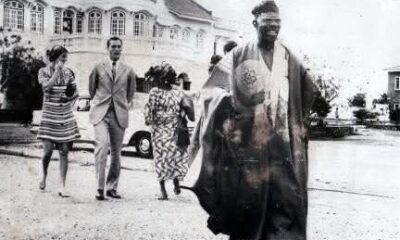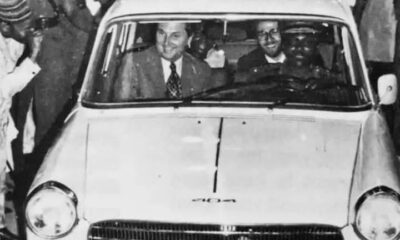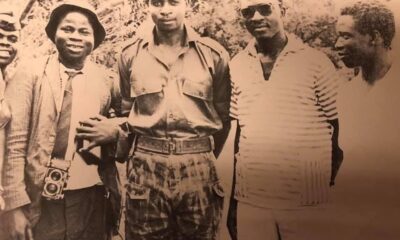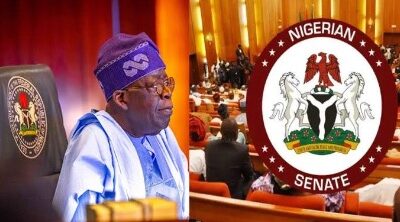Politics
Anioma People are Of Igbo Descent and must be used to balance South East region- Ned Nwoko
Anioma People are Of Igbo Descent and must be used to balance South East region- Ned Nwoko
Let AniomaState be written by Ned Nwoko.
The recent revival of the demand for the creation of Anioma State,
essentially driven by Senator Ned Nwoko, is in keeping with the
aspiration of our people. The demand for the creation of Anioma state
has been long-standing and must rank as one of the oldest agitations
in the political history of Nigeria. Political detractors would want you to believe that Senator Nwoko’s interest in the Anioma State movement is just for his politics. Nothing could be farther from the truth.
The agitation has always been driven by the Anioma people who are of Igbo descent and reside in the northern part of Delta State. The
Anioma people, though located in Delta State, share a distinct Igbo
cultural identity that is remarkably different from the Urhobo and
Itsekiri ethnic groups in the state. This distinctive demand has
enjoyed the support of all well-meaning persons in that enclave. The very term, Anioma, coined by the illustrious Chief (Dr) Dennis
Osadebay as far back as 1951, has remained the unchanging acronym by
which this area has been identified.
So, the inspired poet and politician, the only Premier of the defunct
Mid-West Region, Dennis Osadebay, was the uncontestable founding
father of the Anioma state movement. Down the decades since then,
Anioma people have remained wedded to this ideal that has remained
Osadebay’s greatest bequest to his people as they struggle to find a befitting foothold in the Nigerian commonwealth as well as a plank on
which to build a fast and stable development that should show other
African peoples the way to follow.
Here, one remembers with nostalgia, the role played by proud Anioma
sons and daughters in the early 1980s. Of particular note was the late
Chief Sony Odogwu (Ide Ahaba) and Chief (Hon) Willy Ikolodo (Uwolo of
Ibusa) dual leadership of the Bendel East Cultural Association (BECA),
the activism of Dr. Amadi Emina, Sen. Nosike Ikpo, Ambassador Raph
Uwechue, Chief Andrew Monye, Mr. I. S. Moemeke, Chief Philip Asiodu, Professor B. I. C. Ijeoma, Ambassador Orewa and
Professor Onianwa, just to mention but a few. Creating Anioma State
would provide the Anioma people with a unique platform to preserve,
promote, and develop their cultural heritage. The recognition of
Anioma as a distinct political entity would fulfill their aspirations
for self-determination and ensure their traditions and values are
fully represented at a state level.
The case for creating Anioma State is grounded in several key
arguments, which include cultural identity, equitable representation,
administrative efficiency, and socio-economic development. There is a
historical argument that Anioma lands were arbitrarily merged with
non-Igbo regions during state creation exercises in Nigeria’s colonial
and post-colonial eras. This administrative decision ignored the
cultural and ethnic affinities of the Anioma people with the wider
Igbo community. Rectifying this historical oversight would not only
address a long-standing grievance but also reaffirm the Nigerian
government’s commitment to justice and fairness.
Yet, commentators, including self-styled Anioma experts often failed to mention the lost parts of Anioma, which the British
colonialists carved up and threw to different directions that should
be brought back to their Anioma family. So, Anioma state, when
created should unify the entire Anioma people who were so dastardly
punished by the British for the Ekumeku revolution that lasted all of 31 years—from 1883 to 1914.
By 1870, the crisis between Anioma and Britain had degenerated as the colonialists invaded Ndoni, an Anioma community now in Rivers state,
to gain control of their market. The Royal Niger Company invaded Atani
another Anioma community (now in Anambra state) in 1880; it was pure
genocide. On November 2, 1897, Onicha-Ado (Onitsha) an Anioma
community was bombarded. The following year, Ibusa felt the sting of
the British, in a surprise attack. The Ibusa forces retreated and the
British was still savouring an easy victory when Ibusa
counter-attacked in the first battle of the Ekumeku war. Writing in
1898, Father Zappa emphasized that rather than surrender, “the
Ekwumekwu soldiers continued to resist as the Ibusa forces
reinforced.” The British Commander, Major Festings, appealed for
reinforcement of troops from Lokoja to help subdue Ibusa.
On February 11, 1904, Owa (near Agbor), had to defend herself against
the British. W. E. B. Crawford Coupland, the Divisional Commissioner
ordered for 4 Connaught Rangers, 2.95 artillery and other weapons. Ekute provided military support to the Ekumeku soldiers. The
Commander, Lt H. C. Moorhouse would later defend himself on why he sustained casualties; he said Owa had well-trained soldiers and their
geographical knowledge was an advantage. Mr. S. O. Crewe lost his life
in the battle. This has been rated as one of the fiercest resistances
the Ekumeku warriors put up as the fight raged for weeks.
The battle of Ogwashi-Uku began on November 2, 1909 with a mandate to
the British Forces to kill everybody on their way. Yet, the British
invaders sustained 34 casualties, most notably Captain H. C. Chapman.
In 1910, the British made Ogwashi the Asaba Division Headquarters
(Nigeria’s first LGA Headquarters) and built a prison there to contain the Ekumeku insurgency. Ekumeku fighters rallied from Onicha-Ugbo,
Onicha-Olona, Ubulu-Uku, Obomkpa, Idumuje and other towns to help
Ogwashi in that battle. So the British deliberately balkanized Anioma;
and Anioma territories such as Onicha-Ado and Oguta were permanently
lost to the Easterners. Onitsha’s changed spelling disassociated it
from their Onicha-Olona, Onicha-Ukwu, Onicha-Uku or Onicha-Ugbo kins
in Anioma. Anioma was divided into four and thrown to other groups
who would lord it over them. Asaba Division was joined to the Benin
Province and Aboh Division were joined with Urhobo, Ijaws and
Itsekiris to make up the Delta Province. Onitsha, Oguta and environs
were joined to the Eastern provinces.
This made political unity nearly impossible. This disunity continues
to this day. All that is needed to connect Aboh and or Isiagwu with Oguta is just a bridge; during the Nigerian Civil war, the “Afia Attack”, (War market) was conducted along that axis as inspired
individuals traded with both the Nigerians and Biafrans on both sides of the River Niger leading the Nigerian troops to massacre 400 Ishiagwu people in one night. Boundary adjustment will bring Igbanke,
Ute-Oheze, Iru, Owariozor, Obagie N’Oheze, Ekpon, Owanikeke, Iyenle
people of Edo State, Abuetor and Osekwenike of Bayelsa home, Ndoni of
Rivers, Anambra’s Onitsha, Ozobulu, Obosi, Oraifite and Imo state’s
Oguta to Anioma.
State creation has historically been a tool for promoting unity,
addressing ethnic grievances, and fostering development. Examples
include the creation of Ebonyi State from parts of Abia and Enugu
States, which addressed similar demands for political inclusion and
economic development. The success of these past state creation
exercises provides a valid precedent for the creation of Anioma State,
showing that new states can lead to greater peace, equity, and
prosperity. The push for Anioma State has garnered significant support
from various quarters, including local leaders, cultural groups, and
political representatives. There is a strong consensus within the
Anioma community and a commitment to peaceful advocacy for their
cause. Nationally, the creation of Anioma State would reflect
Nigeria’s commitment to listening to the demands of its diverse
population, ensuring that marginalized groups are given a platform for
development.
By addressing historical grievances and creating a more efficient
administrative unit, Anioma State could serve as a model for future
governance in Nigeria, after all, through the Ekumekwu war, the first
open rebellion against white colonialists in Africa, Anioma taught the entire Africa to fight for political freedom. Anioma state should teach Nigerian states economic viability lessons.
*Prof Sylvester Monye MFR, a proud son of Anioma, was Executive Secretary of the National Planning Commission and Policy Adviser to former President Goodluck Ebele Jonathan, GCON, GCFR.
Politics
Engineers Farouk Ahmed, Gbenga Komolafe resign, President Tinubu nominates successors to the Senate for approval
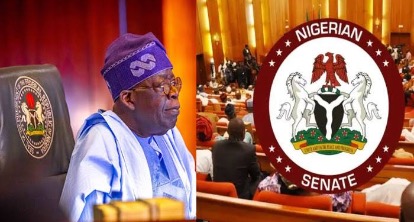
President Bola Ahmed Tinubu has asked the Senate to approve the nominations of two new chief executives for the Nigerian Midstream and Downstream Petroleum Regulatory Authority (NMDPRA) and the Nigerian Upstream Petroleum Regulatory Commission (NUPRC).
The requests followed the resignation of Engineer Farouk Ahmed of the NMDPRA and Gbenga Komolafe of the NUPRC. Both officials were appointed in 2021 by former President Buhari to lead the two regulatory agencies created by the Petroleum Industry Act (PIA).
To fill these positions, President Tinubu has written to the Senate, requesting expedited confirmation of Oritsemeyiwa Amanorisewo Eyesan as CEO of NUPRC and Engineer Saidu Aliyu Mohammed as CEO of NMDPRA.
The two nominees are seasoned professionals in the oil and gas industry.
Eyesan, a graduate of Economics from the University of Benin, spent nearly 33 years with the NNPC and its subsidiaries. She retired as Executive Vice President, Upstream (2023–2024), and previously served as Group General Manager, Corporate Planning and Strategy at NNPC from 2019 to 2023.
Engineer Saidu Aliyu Mohammed, born in 1957 in Gombe, graduated from Ahmadu Bello University in 1981 with a Bachelor’s in Chemical Engineering. He was announced today as an independent non-executive director at Seplat Energy.
His prior roles include Managing Director of Kaduna Refining and Petrochemical Company and Nigerian Gas Company, as well as Chair of the boards of West African Gas Pipeline Company, Nigeria LNG subsidiaries, and NNPC Retail.
He also served as Group Executive Director/Chief Operating Officer, Gas & Power Directorate, where he provided strategic leadership for major gas projects and policy frameworks, including the Gas Masterplan, Gas Network Code, and contributions to the Petroleum Industry Act (PIA).
Engineer Mohammed played a pivotal role in delivering key projects such as the Escravos–Lagos Pipeline Expansion, the Ajaokuta–Kaduna–Kano (AKK) Gas Pipeline, and Nigeria LNG Train.
EVENTS
PRESIDENT TINUBU CONGRATULATES SENATOR IFEANYI ARARUME ON HIS BIRTHDAY
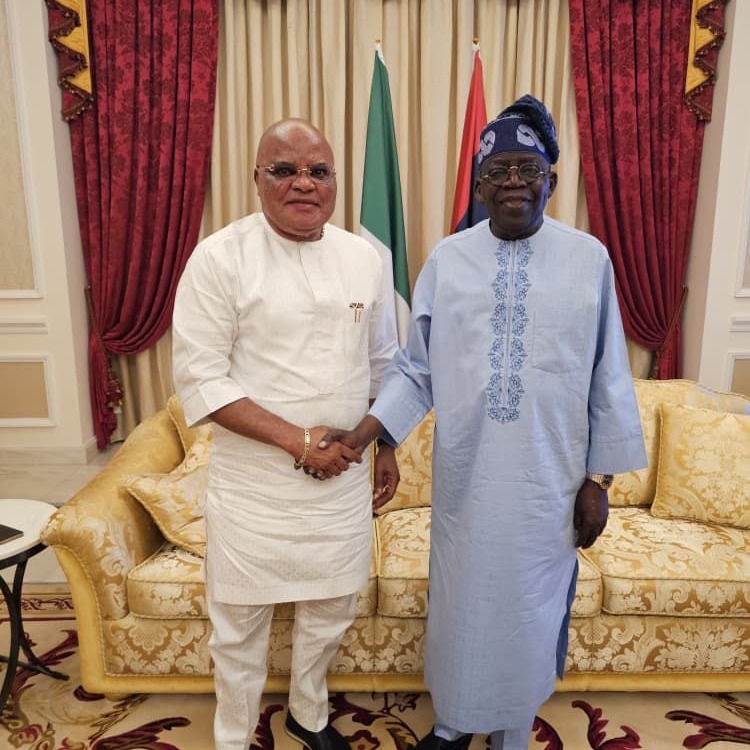
President Bola Tinubu felicitates Senator Ifeanyi Godwin Ararume, astute politician and accomplished businessman, on his birthday, December 16.
Senator Ararume’s odyssey in politics began in the late 1980s, when he served as the State Treasurer of the Liberal Convention in old Imo State. He later joined the National Finance Committee of the defunct National Republican Convention.
He represented Imo North in the 9th National Assembly. He was first elected in May 1999 and re-elected in April 2003. He also served on several committees and held other official roles.
President Tinubu commends the former senator for his years of service to the nation and contributions to its peace, unity, and progress.
The President describes Senator Ararume as a resolute and shrewd politician, highlighting his courageous and remarkable political journey through the years.
President Tinubu wishes Senator Ararume a happy 67th birthday and prays that God Almighty will grant him more years of good health and strength.
Politics
Ndigbo are no longer spectators in the Nigerian project- Minister Dave Umahi dismisses calls for Biafra under Tinubu’s administration
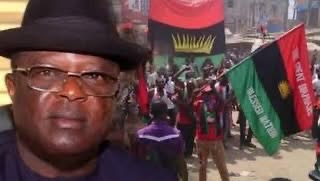
The Minister of Works, David Umahi, says the all-inclusive style of governance being practiced by President Bola Tinubu has made the agitation for Biafra an unnecessary clamour.
While speaking at the inspection of the Enugu-Anambra road last Saturday, December 13, Umahi said the Tinubu administration had given Ndigbo what they had sought for decades, not through secession, but through what he described as unprecedented inclusion in national governance and development.
He explained that the agitation for Biafra was historically driven by neglect, exclusion and underrepresentation at the federal level, but insisted that the situation had changed under the current administration.
“When a people are fully integrated, respected and empowered within the structure of the nation, the dream they once chased through agitation has already been achieved through cooperation.
The push for Biafran secession over the years was borne out of neglect, exclusion and underrepresentation but today the narrative has changed dramatically under President Bola Tinubu.
The President has deliberately opened the doors of national development to the South-East. Appointments, policy inputs and infrastructure priorities now reflect true federal balance.
Every sector now bears visible Igbo footprints. The emergence of Igbo sons and daughters in strategic positions is a testament to this inclusion.
Biafra was never about breaking Nigeria; it was about being counted in Nigeria. Through inclusion, equity and concrete development, Ndigbo are no longer spectators in the Nigerian project; they are co-authors of its future. When justice finds a people, agitation loses its voice.”he said
-
Business1 year ago
US court acquits Air Peace boss, slams Mayfield $4000 fine
-

 Trending1 year ago
Trending1 year agoNYA demands release of ‘abducted’ Imo chairman, preaches good governance
-

 Politics1 year ago
Politics1 year agoMexico’s new president causes concern just weeks before the US elections
-

 Politics1 year ago
Politics1 year agoPutin invites 20 world leaders
-

 Politics1 year ago
Politics1 year agoRussia bans imports of agro-products from Kazakhstan after refusal to join BRICS
-
Entertainment1 year ago
Bobrisky falls ill in police custody, rushed to hospital
-
Entertainment1 year ago
Bobrisky transferred from Immigration to FCID, spends night behind bars
-
Education1 year ago
GOVERNOR FUBARA APPOINTS COUNCIL MEMBERS FOR KEN SARO-WIWA POLYTECHNIC BORI

